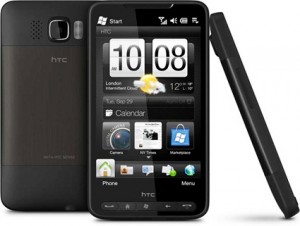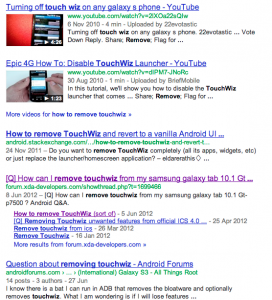I tend to have a slightly different take on the Android ecosystem than others, the main thing being that I place a lot of importance on the stock Android experience (or vanilla Android as we sometimes call it) over manufacturer customizations. I realize that my stand gets me some strange looks from time to time. I’ve spent quite a bit of time answering the same question over and over again, so I figured it’s best that I post my explanation online.
I’d like to start of with a disclaimer on some things, so that you may better understand where I’m coming from:
- I don’t own an Android device. I’d love to, but I don’t have the spare cash. I have borrowed some to use from time to time, though.
- I’m using an iPhone 4, and I’m think it’s a great phone, but it’s not the only great phone in the market
- I’d put myself in the prosumer market. I don’t have the time to delve deep into the phone’s internal workings and I tend to focus more on the experience that the manufacturer offers.
- I value diversity in the marketplace very highly, instead of having one product dominate and stifle innovation
- End-user experience is a very important aspect of products, from my point of view
- I’m not taking into account possible hardware issues with each phone model as those are generally engineering/hardware issues, as opposed to a philosophical issue, which I’m discussing here
- It might occasionally sound like a Galaxy Nexus VS Galaxy S III post, but I’m trying to avoid that. I do make comparisons because those two phones are rather similar, and are both manufactured by Samsung
- These are my reasons for preferring the Galaxy Nexus over the other two phones, it doesn’t mean that the Galaxy Nexus is the better phone for you. In the end, if you’re happy with your phone, then you’ve made the right choice
Now, down to the nitty gritty!
Stock Android is better than TouchWiz and HTC Sense
The main reason why I’d pick the Galaxy Nexus over the Galaxy S III or the HTC One X is the fact that it ships with stock Android, which is the original version of Android released by Google, without all the funny additional software and customizations by manufacturers. I totally understand that manufacturers have to incorporate software features to differentiate themselves from each other, and it would probably be terrible for them to have consumers feel that phones from different manufacturers are all the same, but I don’t feel that funky user interface customizations are the solution to that. To be fair to Samsung, their customizations on the S III, such as S Voice, are a little more useful than what HTC is doing, but more on that later.
Back in the day of Windows Mobile, HTC Sense was a great idea, as it made the system look much better and more usable. Those were the early days. Nowadays the user interfaces (UI) of modern mobile operating systems are much more mature, and are improving at a rapid pace, resulting in these UI customizations becoming more of a bottleneck when the user is trying to get the latest version of the software, rather than something that benefits them. A good example is this recent announcement that HTC One X and One S will be getting Google’s latest Android 4.1 Jelly Bean update. These are HTC’s latest phones, released only a few months ago, as a consumer, if I bought those phones (and we have one in the family), I’d expect to get the latest updates, especially when it’s still the latest phone, why is such an announcement necessary at all?
The issue is that users are used to not receiving the latest update, despite having a relatively new phone. Granted the issue in Malaysia isn’t as serious as it is in the US where mobile carriers muddle the waters, but it’s still an issue nonetheless. If you’re not running the latest phone, there is a possibility you won’t get the latest version, because the manufacturer chose not to support it, not because the phone isn’t capable of running it. Of course, this happens to Apple devices too, but I find Apple tends to offer the latest updates to older devices for a longer period, albeit with some features removed (which is irritating). A good example of this is my mom’s first generation iPad which is able to run iOS 5, though it won’t run the upcoming iOS 6.
You might argue that I’m making a big fuss over something so small, which is a fair argument, but I just tend to prefer the feel of the stock Android interface, and also know that it doesn’t have additional software that I don’t want running on top of it. The simple solution of course, would be for manufacturers to allow us to remove the customizations and install an officially supported version of Android, but there isn’t such an option, and the Internet is full of questions and guides on how to remove TouchWiz and Sense from phones, and they aren’t easy to do.
If only HTC and Samsung had an option in their software updater to “install stock Android”, which would give me an officially supported version of the stock Android. If they had that option, without taking into consideration the price, the choice of picking the Galaxy S III over the Galaxy Nexus is a no-brainer for me.
There are unofficial versions of mobile phone firmwares out there, such as the CyanogenMod, which can give me what I want, but then again, how many normal users will be able to do that, not to mention the fact that if you muck it up and are unable to restore it to the original firmware, there is a high chance that the manufacturer won’t fix it up for you, claiming that you broke it yourself.
S Voice and Google Now, on collision course?
Samsung’s S Voice is a pretty interesting move by the manufacturer, and a reasonable response to Apple’s Siri. Of course, the issue is that now Google has also released Google Now, which is also a form of a digital assistant. S Voice and Google Now have their differences, but the issue is, which system is going to take precedence? Google is working pretty hard to compete with iOS, and that is already a full time job for Android head Andy Rubin, will Samsung have enough dedication and talent to spare just to continually come up with overlapping features? Compared to HTC, Samsung is working real hard to come up with its own ecosystem within the Android ecosystem, offering storage via Dropbox, S Voice as a Siri alternative, and some other features, but as Google Now matures, what will become of S Voice? Will both S Voice and Google Now be in future Android-powered Samsung phones, or will one of them be dropped? This question also applies to any other overlapping features, now and in the future.
Do you remember printer and computer bloatware?
If you’ve purchased a branded notebook that was pre-loaded with Microsoft Windows, it probably came with a bunch of strange antivirus software and all sorts of links to upgrade your Windows and such. Printers are no different either. I always find it hard to believe that in order to install a printer, I need to download an installer that can be several hundred megabytes in size, and sometimes takes up close to one gigabyte of space on my computer, if I happen to go for the automatic installation option. Those things are generally frowned upon nowadays, which is why Dell tends to trumpet the fact that many of its business notebooks don’t come with any additional trial software, and Microsoft even offers an option for a clean installation of Windows that doesn’t include any additional software, though that costs more. So what is my point? It’s the same argument for the mobile phone, I’d like it without all the additional bells and whistles that I don’t want.
Price
One thing I also take into account is that the Galaxy S III is retailing for about RM2000 (About USD635), compared to the Galaxy Nexus which is now going for RM1,300 (USD411), since it has been around for a while, a significant drop from its original selling price of RM2,099. That’s a significant price difference. Of course, there are obvious advantages of paying the extra RM700 for a newer phone, batter camera etc, but based on the points I brought up above, I feel I’d be getting much better value by getting the Galaxy Nexus. On a related note, since the Galaxy S III is available, if you can still get hold of new units of the Galaxy S II, it’s probably going for an attractive price too, around RM1,300 if I remember correctly.
Wrap up:
As I tend to tell people who ask me about my opinion of mobile phones, these are just my opinions. If you’re flush and want the latest phone, then the Galaxy S III and HTC One X are probably some of the best phones you can get, but as for me, I’d still prefer the Galaxy Nexus over them.
If you’re looking for a comparison of the Galaxy Nexus against newer Android phones, The Verge has a pretty good article on it too.
Update: A friend of mine pointed out that I forgot to mention that the original selling price of the Galaxy Nexus when it was launched was RM2,099, which is similar to the current price for the Galaxy S III. Have updated the price section slightly to mention that.




Leave a Reply